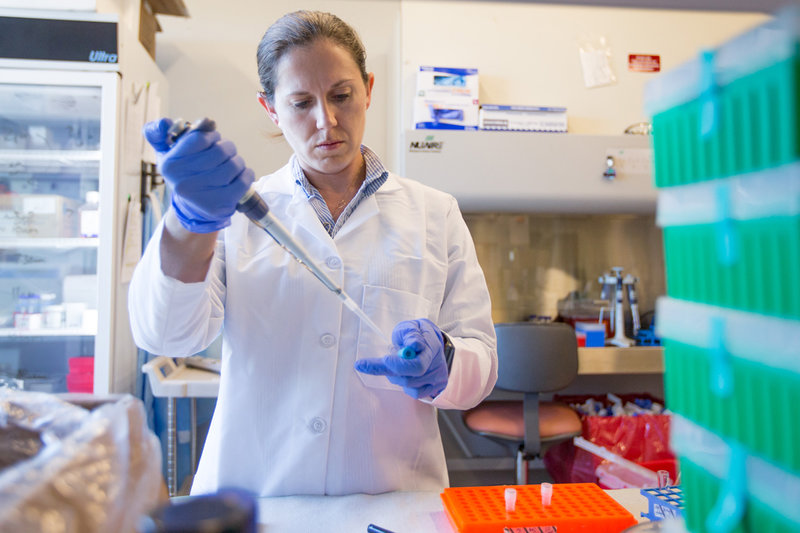By Susan Snyder
The Philadelphia Inquirer
WWR Article Summary (tl;dr) The “Pennovation” site for entrepreneurs includes space for 116 individuals who want a little spot to explore their ideas. This hub of innovation is located in the shadows of one of the nation’s most prestigious research universities (The University of Pennsylvania)
The Philadelphia Inquirer
For more than 80 years, the Grays Ferry site along the south bank of the Schuylkill was home to the DuPont Co.’s Marshall Labs, where workers discovered the substance that led to the development of Teflon.
Now, the University of Pennsylvania, which acquired the 23-acre site in 2010, has created a home for new discoveries, a place where entrepreneurs with an idea can set up shop and grow.
“It’s the continuation of its legacy as an invention hub,” said Craig R. Carnaroli, Penn’s executive vice president.
The $35 million project is about 11/2 miles from the center of Penn’s West Philadelphia campus. It’s being called “Pennovation,” as the large red-letter sign reads over the three-story, 58,000-square foot facility.
The building includes spaces for 116 people who want a little spot to explore their idea in the shadow of one of the nation’s most prestigious research universities, and its faculty and student body.
In addition, there are three-person inventor “garages” with glass doors that open to the outside for projects a little further along; one occupant, a company called COSY, is developing products in artificial intelligence.
Lab spaces on the second floor are hosting Penn-born biotech enterprises, probing new biomarkers for diseases and predicting cardiovascular problems through a blood-based test.
The third floor is dedicated to research around robotics and autonomous vehicles. There’s also an outside area larger than a basketball arena with a net where drones are flown and robots can move around.
During a tour of the site Friday, viewers saw a doctoral student from the emerging company Ghost Robotics run a small four-legged robot, called Minitaur.
“The idea is to provide the stepping stones by which a company can grow and stay here as they grow,” said Anne Papageorge, Penn’s vice president for facilities and real estate services. “What we’re trying to do is provide flexibility and affordability for young companies, because they don’t have a lot of capital in their early stages of growth.”
In the core of the space is equipment for community use, some of it donated by Merck & Co. Entrepreneurs and their fledging companies pay rent for space at the center.
The building, which will officially open later this month, already is 80 percent full. Among the tenants are a team from the Hershey Co. that will explore new techniques in manufacturing, packaging and food production.
Two companies started by Penn students, who won university president Amy Gutmann’s innovation prize last year, also have space in the center. Fever Smart has developed a medical device and “cloud information system” that allows patients and medical workers to monitor body temperature and get alerts when it rises to unsafe levels. The entrepreneurs have pitched their product to the parents of young children and are expanding into the clinical setting.
William Duckworth, 22, one of three Fever Smart founders, said he was excited to be part of Pennovation.
“It’s a cool thing for me because it’s a connection between my company and the Penn community,” said Duckworth, who graduated from Penn in May with a mechanical engineering degree.
The center also includes a triangular set of bleachers where entrepreneurs can make their pitches to audiences.
As some of the entrepreneurs grow their ideas, they may want to expand into another building on the property. There is room to grow, Papageorge said.
“We could build up to 1.5 million square feet,” she said. “Currently, we have 250,000 square feet.”
Several other groups are using other buildings on the property. Henry Daniell, a professor at Penn’s school of dental medicine, has a greenhouse where he is developing encapsulated freeze-dried lettuce with medicine. KMel Robotics, started by graduates of the engineering school, are in another building. KMel recently was acquired by Qualcomm Technologies, a Fortune 500 company.
Pennovation, the name, came from Gutmann. When she shared it with hundreds at an alumni event in 2013, she asked them to say the word with her.
“It had a nice ring to it,” she said. “Everybody smiled, and we ran with it.”
Gutmann said the project was an outgrowth of the university’s strategic plan that called for a place where faculty and student research can be developed and introduced into the marketplace. Penn’s Center for Innovation, which helps commercialize Penn’s research inventions, is based at the center.
Over the last six years, the center has helped to start 140 companies, 65 of which currently are in motion, said Michael Poisel, director. Penn, which owns equity in the companies, has received revenue more than 10 times its investment, he said.
Gutmann expects Pennovation to add another $1 billion in economic impact in Pennsylvania.
“More and more, universities need to show how we can make a big difference in the world,” she said. “This is one important way, right here in the city.”














































































































































































































































































































































































